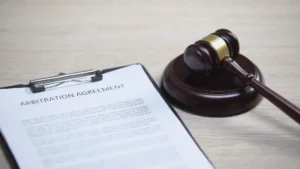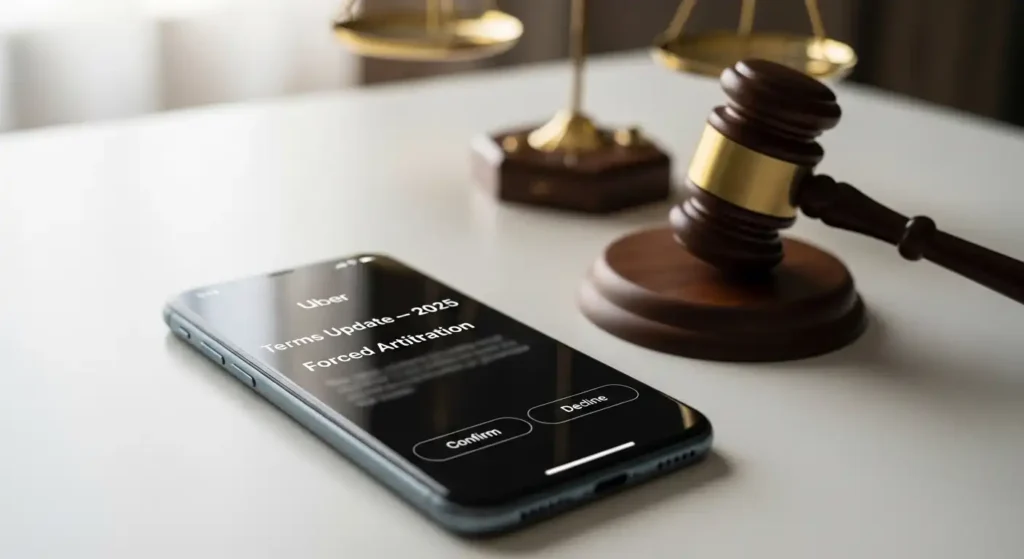Forced arbitration has become a defining feature of the gig economy, with companies like Uber integrating these clauses into both rider agreements and driver contracts. Instead of resolving disputes in public courts, forced arbitration channels disagreements—such as those stemming from Uber accident claims—into private proceedings. This shift places significant control in the hands of corporations and limits the legal recourse available to individuals.
Understanding the impact of forced arbitration on Uber accident claims in 2025 is essential for anyone who uses or drives for rideshare platforms. As these provisions become standard practice, injured parties seeking compensation after an Uber-related accident face unique hurdles. Many discover only after an incident that their options for pursuing damages are limited by terms they likely accepted with a single click.
Several legal debates are intensifying around this issue. Key court decisions and new legislation are shaping the 2025 legal landscape, directly affecting how accident victims can seek justice. For anyone involved in an Uber accident—whether as a passenger, driver, or third party—it’s critical to stay informed about how forced arbitration may impact your rights if an accident occurs.
Understanding Forced Arbitration
 Forced arbitration is a process where disputes are resolved by a private arbitrator instead of going through the public court system. This alternative to litigation often limits your right to a jury trial, keeps proceedings confidential, and typically restricts appeals. The forced arbitration definition centers on the idea that parties must resolve disagreements outside traditional courts, whether or not they fully understand or consent to the process.
Forced arbitration is a process where disputes are resolved by a private arbitrator instead of going through the public court system. This alternative to litigation often limits your right to a jury trial, keeps proceedings confidential, and typically restricts appeals. The forced arbitration definition centers on the idea that parties must resolve disagreements outside traditional courts, whether or not they fully understand or consent to the process.
Within Uber’s business model, arbitration agreements are built directly into both the user terms of service and driver contracts. These clauses state that any dispute—including accident claims, billing disputes, or employment issues—must be handled through private arbitration rather than a lawsuit in court.
Most users and drivers accept these terms without a detailed review. When you sign up for Uber—whether as a rider or a driver—you typically agree to the Uber terms of service with just a single click or tap. The mandatory arbitration language is usually buried deep in those agreements, written in dense legal jargon that few people read end-to-end.
Key points about forced arbitration with Uber
- Settlement of disputes occurs privately
- Jury trials and class actions are waived
- Users agree simply by using the app or accepting updated terms
This structure has significant implications for anyone involved in an Uber accident claim, affecting what rights you retain and what processes you must follow if something goes wrong during a ride.
The Impact of Forced Arbitration on Uber Accident Claims
Uber accident claims typically involve allegations of negligence, reckless driving, or failures in safety protocols. Injured passengers, drivers, and even third parties often seek compensation for medical expenses, lost wages, or pain and suffering through personal injury claims against Uber.
Mandatory arbitration changes the landscape for these claims.
1. Restricted Lawsuit Options
Once you accept Uber’s terms, the mandatory arbitration clause usually eliminates your ability to take your case to a public court. This means you cannot present your claim before a jury or benefit from class actions with other injured parties.
2. Arbitration vs. Court Litigation
In arbitration, a private arbitrator—often chosen according to the rules in Uber’s agreement—reviews evidence and makes a binding decision. The process is confidential, less formal than court, and generally offers limited opportunities to appeal an unfavorable outcome.
3. Procedural Differences
Traditional court litigation allows for discovery (the exchange of evidence), public hearings, and detailed legal arguments. Arbitration typically limits these steps, which can reduce costs but may also restrict the injured party’s ability to gather crucial evidence or hold Uber publicly accountable.
The result is a system where individuals facing personal injury claims with Uber must navigate private dispute resolution channels that often favor efficiency over transparency. This shift impacts not only the process but also the potential outcomes for those seeking fair compensation after an accident involving an Uber ride.
Recent Legal Developments Shaping Arbitration Enforcement with Uber (2023–2025)
Recent years have seen major shifts in how courts approach the enforceability of arbitration clauses in Uber accident claims. Several Uber arbitration court cases have reached state and federal appellate courts, often focusing on whether injured riders or drivers can be compelled to resolve disputes through private arbitration rather than public court.
1. New Jersey appeals court decision
In 2024, a New Jersey appellate panel highlighted the difficulties courts face when contract language isn’t clear. The court scrutinized Uber’s user agreement, questioning whether the language provided sufficient notice that users were waiving their right to sue in court. The ruling emphasized that ambiguous or “buried” terms may not always be enforceable, especially if consumers are not clearly informed that they are agreeing to mandatory arbitration.
2. Challenges with interpreting agreements
Across multiple states, judges have noted the challenge of interpreting “clickwrap” or one-click agreements, especially those embedded deep within terms and conditions. The ambiguity of these clauses often leads to split decisions: some courts uphold Uber’s arbitration provisions, while others strike them down for lack of clarity.
3. Importance of appellate decisions
Appellate decisions play a pivotal role. When higher courts overturn lower-court rulings that enforced forced arbitration—citing unclear notification—Uber must adjust its contracts or risk further litigation. On the other hand, when appellate courts side with Uber, plaintiffs face steeper barriers to pursuing accident claims outside of arbitration.
These evolving legal standards shape both the impact of forced arbitration on Uber accident claims in 2025 and the broader landscape for gig economy dispute resolution. Courts’ willingness to scrutinize the clarity and prominence of arbitration clauses continues to influence whether accident victims retain access to public courts or must proceed privately.
Future Outlook for Forced Arbitration in Gig Economy Claims and Practical Advice for Uber Users Facing Accident Claims Under Forced Arbitration
 Ongoing appeals and legislative proposals are shaping the future of forced arbitration in the gig economy. Lawmakers in several states are considering bills to restrict or ban mandatory arbitration clauses in ride-hailing contracts. Federal legislative efforts, such as the FAIR Act, continue to gain visibility and support. These changes signal that the legal framework around Uber’s appeals on arbitration clauses may shift, potentially giving consumers and drivers new leverage.
Ongoing appeals and legislative proposals are shaping the future of forced arbitration in the gig economy. Lawmakers in several states are considering bills to restrict or ban mandatory arbitration clauses in ride-hailing contracts. Federal legislative efforts, such as the FAIR Act, continue to gain visibility and support. These changes signal that the legal framework around Uber’s appeals on arbitration clauses may shift, potentially giving consumers and drivers new leverage.
If you’re facing an accident claim against Uber under a forced arbitration clause:
- Seek legal counsel with proven experience in rideshare arbitration disputes. Not all personal injury attorneys have handled private arbitration—specialized knowledge can make a significant difference.
- Review your contract terms closely. Some arbitration clauses have opt-out provisions or loopholes that an attorney can identify.
- Document everything related to your claim. Detailed records of the accident, medical treatment, and all communications with Uber will strengthen your position during arbitration.
- Prepare for procedural differences. Arbitration typically means limited discovery, shorter timelines, and restricted rights of appeal compared to court litigation.
The landscape is shifting as courts and lawmakers reevaluate how gig platforms structure user agreements. Staying informed about gig economy legal trends helps users navigate these evolving challenges with greater confidence.
Conclusion
It’s crucial to stay informed about your rights in Uber accidents as the situation with forced arbitration continues to change. Forced arbitration affects access to justice, usually making things less transparent and limiting legal options for users and drivers. The ongoing discussions and appeals about the impact of forced arbitration on Uber accident claims in 2025 show why we need to be watchful. You can benefit by knowing your choices, getting legal advice early on, and keeping an eye on reforms that may impact future claims. Understanding how these agreements affect your chances of getting fair compensation is the first step towards empowerment.

